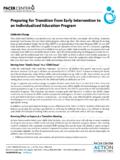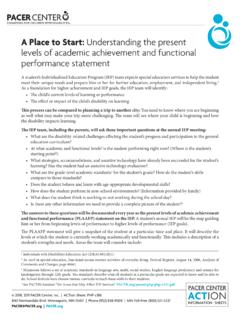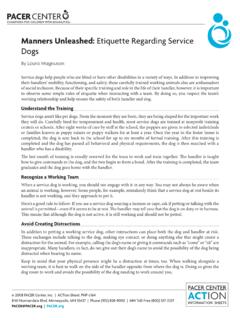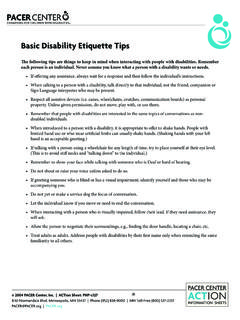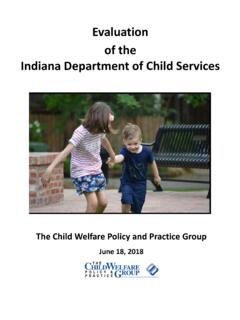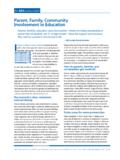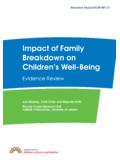Transcription of TEFRA (Tax Equity and Fiscal Responsibility Act)
1 MCYSHN and DHS 8-10-10 TEFRA SUMMARY What is TEFRA ? The Tax Equity and Fiscal Responsibility Act ( TEFRA ) of 1982 is a federal law that allows states to make Medical Assistance (MA) available to certain children with disabilities without counting their parent s income. No additional services other than the MA benefit set are provided under the TEFRA option, but TEFRA can extend MA eligibility for children who are disabled and would not otherwise have a basis of eligibility. If a child needs additional services, they can apply for Home and Community-Based Services Waivers [NOTE: more information on Waivers is included later in this DHS topic packet] Who is eligible? A child must meet all of the following: 1. Child is under age 19 years [NOTE: Beginning at age 18, the person usually doesn t need TEFRA , since parent income is no longer counted if the youth is disabled.]
2 ] 2. Child lives with at least one biological or adoptive parent 3. Child is certified disabled [by the State Medical Review Team (SMRT)] 4. Child requires the level of care provided by: A hospital A nursing home, or An Intermediate Care Facility for persons with Mental Retardation (ICF/MR) and related conditions *The cost for home care must not be more than the cost MA would pay for the child s care in an institution. 5. Child s income is under MA limit of 100% of the Federal Poverty Guideline (FPG) for a household size of one. There are no asset limits. Children with incomes over 100% FPG can spend down to 75% FPG. [NOTE: TEFRA is available to noncitizen children as another way to access NMED and EMA services without counting parent s income. For EMA, the child would also need to have a medical emergency.] How is eligibility determined? The State Medical Review Team (SMRT) determines if the child is disabled, and issues a disability certification for 1-4 years, depending on the severity of the child s conditions(s).
3 At the end of the certification period, the child must reapply with SMRT. To be certified disabled for TEFRA , the child must meet both (1) disability and (2) level of care criteria: 1. Disability review: Medical, psychological and school records are reviewed to determine if the child s condition(s) meet the disability criteria from the Social Security Administration (SSA). [NOTE: these disability criteria are contained in the Tools topic packet in this manual under SSI Medical Evaluation Guidelines-Part B (for children under age 18 yrs.)] SMRT assigns each case to a SMRT Case Manager, who reviews the case and decides if there is enough evidence to make a disability determination. If SMRT needs more evidence, the SMRT Case Manager can assist the client in obtaining the evidence by: o Contacting the client directly, o Contacting the client s providers and requesting documents.
4 O Arranging an appointment for an evaluation, if necessary. *If the client has no coverage, SMRT can authorize payment for an evaluation, including transportation. 1 MCYSHN and DHS 8-10-10 2. Level of Care review: SMRT determines the level of care using evidence from medical providers, school-based providers, and others. Parents input is also required and is provided by completing a Children s Disability Worksheet (DHS #6126). This worksheet allows parents to express their view of their child s condition(s); their child s ability to perform activities of daily living; and their child s behavior at home, at school, and in the community Can a family appeal a decision that their child does not meet disability criteria? Yes. A fair hearing request must be made orally or in writing within 30 days by telling their county worker or writing to the State Appeals Office at the DHS.
5 If the family appeals a recertification denial within ten days of receiving the denial notice or before the termination date, TEFRA will continue while the appeal is heard and decided. If the family appeals more than 30 days after receiving SMRT s decision, a hearing will be scheduled to decide if there is good reason for requesting the hearing late. If the family loses the appeal, they may be asked to repay to MA the child s service costs that were paid during the appeals process. Is there any cost to the family? Parents may have to pay a parental fee based on family size and income. [NOTE: Information on Parental Fees is included later in this DHS topic packet] Children with disabilities whose family income is within regular MA income standards do not need TEFRA . It may be better for some families to not apply for TEFRA if the child would be eligible for regular MA with a spend-down as the spend-down may be less than the parental fee.
6 What happens when the TEFRA enrollee turns age 18? An application should be made for Supplemental Security Income (SSI). The youth s MA is left open (as a disabled child ages 18-21) while the SSI determination is pending. If SSI determines that the youth is not disabled and the youth continues to live with the parents, MA eligibility would be determined using the children under 21 basis and the parent income would be counted. What if a child with a mental illness or a Severe Emotional Disturbance (SED) is not TEFRA eligible? If the child doesn t meet the TEFRA level of care criteria, the child may still be eligible for certain mental health services from their county human services agency. If the child has an SED, the child can receive county case management services and other family community support services under the Children s Mental Health Act.
7 This may include crisis placement, help with independent living and parenting skills, day treatment, respite care, and a number of other services. If the child has an emotional disturbance (ED), some services, including crisis assistance, may still be available from their county. [NOTE: See Mental Health topic packet for more information.] How do you apply for TEFRA ? Contact your county human services (social services) agency and ask to speak with a Developmental Disability Social Worker about TEFRA . Complete the MHCP application to determine if there is eligibility for regular MA (because it does not require parents to pay a parental fee). Provide all required documentation to the county for a SMRT disability determination (unless your child has already been determined disabled by SSA) [SOURCES: [1] DHS Disability Manual (7-09); [2] MHCP Manual, Sections and (downloaded 7/22/10)].
8 2 State Medical Review Team Medical Assistance TEFRA OptionRequired Documentation for Physical DisabilityState Medical Review Team PO Box 64984 St. Paul, MN 55164-0984 The following information is required to complete your client s physical disability determination. Please do not submit the case unless all of these items are of a routine physical examination signed by the physician (no more than 3 months old) which includes:Current diagnosis Clinical findings results of physical or mental status examsLaboratory findings, for example: blood pressure blood test results X-rays Required treatments (include type of treatment, who performs it, and if supervised, credentials of supervisor)Current medications Growth data from the past year (height and weight)Reports from any consulting medical specialists. The report should be no more than 3 months old and include the primary diagnosis, a detailed summary within the areas of specialty of examination.
9 Also include results of any tests, X-rays, or scans that confirm the diagnosis, and treatment and Children s Disability Worksheet (DHS-6126) to be completed by the applicable, an Individual Education Plan (IEP) or Individual Family Service Plan (IFSP) that is current within 1 year, along with the most recent Team Assessment Summary (done every three years). For children under school age, submit an Early Childhood Assessment the client receives ANY other special services ( speech, physical, or occupational therapy or rehab), please provide updated evaluations and progress notes regarding these summaries from any recent you have any questions concerning this information, please call SMRT at (651) 431-2493 or (800) 6-103 State Medical Review Team Medical Assistance TEFRA OptionRequired Documentation for Developmental Disability The following information is required to complete your client s developmental disability determination.
10 Please do not submit the case unless all of these items are Medical Review Team PO Box 64984 St. Paul, MN 55164-0984 Results of a routine physical examination (no more than 3 months old) performed by a medical doctor which includes:Current diagnosis Clinical findings results of physical exams Laboratory findings, for example: blood pressure blood test results X-rays Current medications Reports from any consulting medical Children s Disability Worksheet (DHS-6126) to be completed by the Individual Education Plan (IEP) or Individual Family Service Plan (IFSP) that is current within 1 year, along with the most recent Team Assessment Summary. For children under school age, submit an Early Childhood Assessment recent achievement and IQ scores Adaptive behavior rating by both parent and teacher, for example:The Vineland Adaptive Behavior Rating Scale The Battelle Inventory The Childhood Autism Rating Scale These documents are most often found in the Team Assessment Summary that comes from the school, but they may also be performed by psychologists or developmental the client receives ANY other special services ( speech, physical, occupational therapy, rehab), please provide updated evaluations/progress notes regarding you have any questions concerning this information, please call SMRT at (651) 431-2493 or (800) 6-104 State Medical Review Team Medical Assistance TEFRA OptionRequired Documentation for Mental Health Disability Results of a routine physical examination (no more than 3 months old) performed by a medical doctor which includes.

